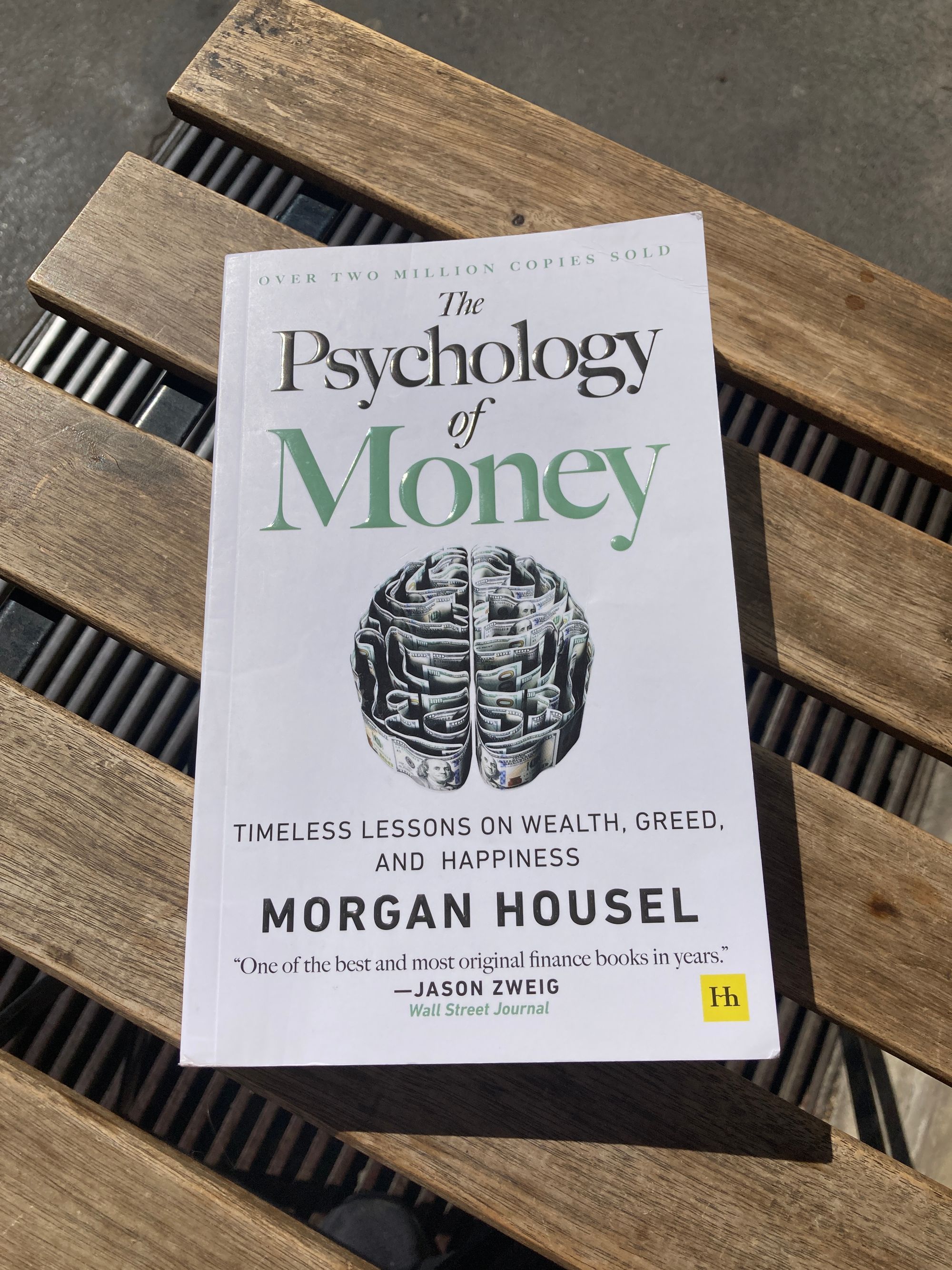The Psychology of Money (Morgan Housel) - Book Summary, Notes & Highlights

By showing us that there is more to financial markets and investing than cold logic and rational thinking Morgan Housel makes the topic of money and finance come alive.
⏳The Book in 3 Sentences
- Reasonable investing might be more effective than rational investing because humans are not rational and our investing strategy should reflect this.
- Personal finances are personal, find what works for you and your psychology, and don't worry too much about what others are doing.
- Don't let your lifestyle costs run up whenever you get a higher income, instead keep your spending below your income to build wealth.
🎨Impressions
This book writes about the topic of personal finance and investing from a new and interesting perspective. Acknowledging that psychology plays a major role in our financial decisions is important.
Morgan's style of writing and storytelling is both enjoyable and packed with insights. It helped me realize the importance of understanding your own psychology and behaviors to become a better investor.
📖Who Should Read It?
I would highly recommend this book to everyone with an interest in personal finance, investing, and the role of human behavior in economics. The book is written in a way that requires no previous knowledge of the topic. I believe you will enjoy it if:
- You want to learn more about personal finance, investing, and wealth creation.
- You enjoy learning in a story-based format. The lessons of the book are explained through stories and real-life examples.
- You want to gain a better understanding of the role psychology and human nature plays in economics.
- You are curious and want to gain a different perspective on financial markets.
👩🏫Lessons I Have Learned
How my life / behavior / thoughts / ideas have changed as a result of reading the book.
- It helped me understand the importance of having buffer money saved away to be prepared for unforeseen costs.
- It strengthened my belief that beating the market is extremely hard and having a majority of your investments in index funds may be a better return on your time than trying to beat the market.
- I understood that the road to being wealthy is not to earn more money, but to limit your spending. Many rich people are not wealthy.
- Reading "Nothing is as good or as bad as it seems" served as a good reminder to enjoy the good times when they last and remember that the bad times are only temporary
📝Summary + Notes
1. Beating the market is extremely hard! Index funds might be a better return on investment for your time!
Hedge funds and other investors often spend millions of dollars to gain a slight information edge on the market to be able to outperform by a percentage point or two. Why should it be that much easier for you to do it? I don't believe fully in the efficient market hypothesis, there are people who are living proof like Warren Buffett that show us you are able to outperform over a long time. But be realistic, are you putting in the same amount of time in your investing as Warren Buffett is? If you are willing to spend hours each day reading annual reports, books on investing, and all the other things needed to outperform by all means do it! What I realize however for people like myself is that we might have a higher ROI (return on investment) on our time if we instead of looking for investments, invest in ourselves, our jobs, or our businesses and let our investments automatically compound in index funds.
2. Having the opportunity to say "I can do whatever I want today" might be the highest form of wealth.
If I told you I would give you a million dollars for you to spend 80,000 hours doing something you don't like doing would you do it? 80,000 hours is a long time, but that is on average how much time we will spend on our careers according to the organization 80,000 hours. For this reason, it is important that we find things we like doing with our days. Having the money to be able to quit a job you dislike and apply for a new one or take an extended vacation will make your life easier. If you don't have any money saved up you may be forced to take a job you hate to pay the bills.
3. Reasonable investing > Rational investing
A reasonable investing strategy will allow most people to be more long-term in their investing than a rational one will. Investing strategies that assume rational decision-making by humans will often not perform to their theoretical levels in real life. Having some cash as a buffer may not be the best strategy from a strictly rational perspective but it can allow you not to sell when the market is down. Find a strategy that is reasonable for you and your psychology and remember that what works for you might not be the same as someone else depending on their experiences and risk tolerance.
4. Nothing is as good or as bad as it seems
This is true both in financial markets and in life. Financial bubbles often make it seems like we are all investing geniuses and that beating the market is a cakewalk, but that is not quite true. On the flip side in recessions it seems like the world will come to an end and why should you be investing money into the market then? But that is when returns are created. Remembering that life and economies often are cyclical will allow you to treasure the good times, yet be aware that they are not forever similarly in the bad times you can acknowledge that you are in a temporary slump, but time and effort will get you and/or the economy out of it. This reminded me of the stoic practice of negative visualization, visualizing a negative event before it happens can help you deal with it when it happens. For a primer on stoicism, you can read my article on it here.
5. Being rich and being wealthy are two separate things.
Morgan Housel defines rich as having a high current income and wealthy as having income you do not spend. This shifts the focus from looking at how much you are earning to including what you are spending too. By this definition plenty of rich individuals, are not wealthy because they spend as much or more than they earn. The example that comes to my mind is athletes that get these huge contracts that could set them up for life, but they have such a high spending rate that many of them are broke a few years after their careers end. To become wealthy you have to ensure that you are living below your means, saving money every month, and ensuring that you build your wealth.
6. Staying wealthy is a separate skill from getting wealthy
Many people become wealthy by taking risks and betting on themselves. Unfortunately, this skill set does not always lend itself to staying wealthy. To stay wealthy you need caution, diversification and not overspending. This may require a mindset shift from the mindset that got you wealthy.
7. Peace of mind can be more valuable than higher returns
If you struggle to sleep at night because of your investments then you are probably taking too much risk for yourself. Even if it theoretically means you will lower your returns by taking some money off the table and keeping it in cash, the added buffer may give you peace of mind. That can be worth a lot more than investment returns and will help you stay calm when the markets become volatile.
